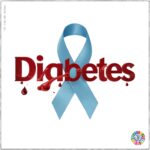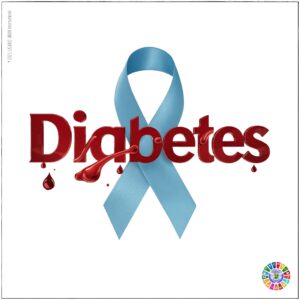CAMPAIGN DIABETES: Awareness
The Lazarus Union, a notable international humanitarian organization dedicated to addressing various global health issues, has launched a campaign to raise awareness about diabetes. This initiative is not merely a response to a prevalent health issue but a strategic alignment with the United Nations’ Agenda 2030 and its Sustainable Development Goals (SDGs). Diabetes, a chronic disease with increasing global prevalence, represents a significant challenge to sustainable development, health equity, and economic stability. This essay explores why the Lazarus Union is focusing on diabetes awareness, illustrating its relevance to Agenda 2030 and the SDGs.
Understanding Diabetes and Its Global Impact
Diabetes mellitus, encompassing Type 1 and Type 2 diabetes, is a major public health concern characterized by chronic hyperglycemia. According to the International Diabetes Federation (IDF), approximately 537 million adults globally are affected by diabetes, with projections indicating that this number could rise to 783 million by 2045 if current trends continue (IDF Diabetes Atlas, 2021). The disease imposes a substantial burden on healthcare systems, economies, and individual lives. It is associated with severe complications such as cardiovascular disease, kidney failure, neuropathy, and retinopathy, which contribute to high mortality rates and decreased quality of life (World Health Organization, 2022).
Agenda 2030 and the Sustainable Development Goals
The United Nations’ Agenda 2030 is a global blueprint for achieving sustainable development across economic, social, and environmental dimensions. The agenda is structured around 17 SDGs, each with specific targets aimed at addressing global challenges and ensuring a more equitable and sustainable future. Diabetes intersects with several SDGs, making it a critical focus for the Lazarus Union’s campaign. The key SDGs relevant to diabetes include:
- ODS 3: Boa saúde e bem-estar
- ODS 6: Água potável e saneamento
- ODS 10: Redução das desigualdades
- ODS 13: Ação climática
- ODS 17: Parcerias para os objetivos
Relevance to SDG 3: Good Health and Well-being
SDG 3 aims to ensure healthy lives and promote well-being for all at all ages. Diabetes is a major contributor to non-communicable diseases (NCDs) and represents a significant challenge to global health. The Lazarus Union’s campaign aligns with SDG 3 by focusing on:
- Prevention and Management: Educating the public about diabetes prevention strategies, such as lifestyle modifications, and the importance of early diagnosis and management to prevent complications.
- Healthcare Access: Advocating for improved access to diabetes care and treatment, particularly in underserved regions where healthcare resources may be limited.
By addressing diabetes, the Lazarus Union supports efforts to reduce premature mortality and improve overall health outcomes, directly contributing to the achievement of SDG 3.
Relevance to SDG 6: Clean Water and Sanitation
SDG 6 focuses on ensuring availability and sustainable management of water and sanitation. While diabetes itself may not directly relate to water and sanitation, the management of diabetes and its complications can be affected by access to clean water and adequate sanitation. For instance, individuals with diabetes are at higher risk of infections and complications related to poor sanitation. Additionally:
- Preventive Care: Access to clean water and proper sanitation is essential for effective diabetes management and prevention of related infections. The Lazarus Union’s campaign can help raise awareness about the broader determinants of health that impact diabetes care.
Relevance to SDG 10: Reduced Inequalities
SDG 10 aims to reduce inequality within and among countries. Diabetes disproportionately affects marginalized and low-income populations, exacerbating health disparities. The Lazarus Union’s campaign addresses these inequalities by:
- Equitable Access: Advocating for equitable access to diabetes care, education, and resources, particularly for underserved and vulnerable populations.
- Health Literacy: Promoting health literacy to empower individuals with knowledge about diabetes prevention and management, thereby reducing disparities in health outcomes.
By addressing these inequalities, the campaign contributes to more equitable health outcomes and supports the goals of SDG 10.
Relevance to SDG 13: Climate Action
SDG 13 emphasizes the need for urgent action to combat climate change and its impacts. Climate change affects diabetes management in several ways:
- Impact on Health: Climate change can influence the prevalence of diabetes-related complications, such as heat-related illnesses and vector-borne diseases.
- Sustainable Practices: The campaign can also promote sustainable practices, such as reducing the environmental impact of diabetes care products and advocating for eco-friendly solutions.
By integrating climate action into diabetes awareness efforts, the Lazarus Union supports the holistic approach of SDG 13 and its impact on public health.
Relevance to SDG 17: Partnerships for the Goals
ODS 17 focuses on strengthening partnerships to achieve the SDGs. The Lazarus Union’s campaign exemplifies this by:
- Collaborative Efforts: Partnering with healthcare organizations, governments, and community groups to amplify the impact of diabetes awareness initiatives.
- Global Networks: Engaging with international organizations and leveraging global networks to share knowledge, resources, and best practices for diabetes prevention and management.
By fostering partnerships, the campaign enhances collective efforts to address diabetes and supports the achievement of SDG 17.
Campaign Strategies and Implementation
The Lazarus Union’s diabetes awareness campaign involves several strategic actions:
- Educational Initiatives: Developing and distributing educational materials, hosting seminars, and using digital platforms to increase public knowledge about diabetes.
- Advocacy: Lobbying for policy changes that improve access to diabetes care, reduce health disparities, and promote sustainable practices.
- Envolvimento da comunidade: Organizing community events, health screenings, and support groups to engage individuals and provide practical resources for diabetes management.
Conclusão
The Lazarus Union’s campaign for diabetes awareness is a crucial initiative that aligns with the United Nations’ Agenda 2030 and its Sustainable Development Goals. By focusing on diabetes, the campaign addresses key aspects of global health, equity, and sustainability. The campaign’s efforts to educate, advocate, and engage communities contribute significantly to the achievement of SDG 3, SDG 6, SDG 10, SDG 13, and SDG 17.
In conclusion, addressing diabetes through targeted awareness campaigns not only improves individual health outcomes but also supports broader global development goals. The Lazarus Union’s commitment to this cause underscores the importance of integrated approaches to tackling complex health challenges and advancing sustainable development.
Referências:
International Diabetes Federation. (2021). IDF Diabetes Atlas 10th Edition 2021. Retrieved from https://www.diabetesatlas.org
World Health Organization. (2022). Global Diabetes Dashboard. Retrieved from https://www.who.int/data/gho/data/themes/topics/diabetes
American Heart Association. (2021). Heart Disease and Diabetes. Retrieved from https://www.heart.org/en/health-topics/diabetes
National Kidney Foundation. (2022). Diabetes and Kidney Disease. Retrieved from https://www.kidney.org/atoz/content/diabetes
American Diabetes Association. (2022). Standards of Medical Care in Diabetes—2022. Diabetes Care, 45(Supplement 1), S1-S112.
Diabetes UK. (2022). Diabetic Retinopathy Statistics. Retrieved from https://www.diabetes.org.uk/
National Institute of Diabetes and Digestive and Kidney Diseases. (2022). Diabetes Statistics. Retrieved from https://www.niddk.nih.gov/
Centers for Disease Control and Prevention. (2022). Diabetes and Health Literacy. Retrieved from https://www.cdc.gov/




